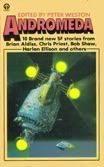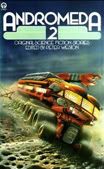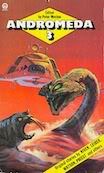2011 books



Peter Weston's Andromeda series of original fiction anthologies - named after Rog Peyton's famous Birmingham SF bookstore - still provides quite a bit of curiousity value from the late 1970s. Starting out strongly, it noticeably declined in consistency and quality by the second volume before PW had to literally call in a few favours for the third, a tactic which thankfully capped it on a stronger note. It was a short-lived series and one that gave PW a fair amount of stress for the duration, but it did have a few highlights still worth reading today that can't be found anywhere else.
2) Peter Weston, ed., Andromeda 1, 1976
Christopher Priest and Harlan Ellison are two names that don't sit comfortably together, but they provide two of the highlights of this first outing. Priest's excellent and haunting story 'An Infinite Summer' - first submitted to Ellison's still unpublished The Last Dangerous Visions and therefore destined to disappear without trace - was pulled from Ellison's clutches and instead given its first appearance here. It was the right move and is by far the best story, followed by (for me) Robert Holdstock's colourfully romantic 'Travellers', then Ellison himself has the typically angry and energetic story 'Seeing', a good one in it's own right but something that doesn't seem to fit alongside most of the other stories here, which is possibly why it was placed at the end as a final flourish. A strong beginning, and Ursula Le Guin reckoned so too.
3) Peter Weston, ed., Andromeda 2, 1977
Andromeda 2 saw the realisation of PW's wider plan for the series which was to include a few stories by completely unknown writers. Possibly prime among them was Tom Allen - actually (and I had to do some research here) Tom Allen Shippey, and one of the two reasons he adopted the pseudonym was to protect his career as an Oxford historian from the tarnish of any association with science fiction - his story 'King, Dragon' was a very confident debut that feels like a Tolkeinian dragon fantasy until its SFnal context comes clear. Another name that first appeared in this volume was William F. Wu, who has since had a long list of short fiction published. This volume also saw the last fiction from the short career of Scott Edelstein, as well as another highlight with the similarly romantic 'A Small Event' from Robert Holdstock. This volume is capped with Richard E. Geis's novella 'One Immortal Man', something that's written competently enough, I suppose, but at the same time feels like it was penned by a hormone-saturated college boy with some very adult fantasies. Okay, Geis has become famous for his soft porn and this was his first sale as a writer of science fiction, but I wonder if there weren't other stories available that might have ended this collection more, shall we say, appropriately - I felt grubby after reading it. Still, this was a decent enough collection for starting the careers of some writers.
4) Peter Weston, ed., Andromeda 3, 1978
In his introduction PW doesn't mind giving away the fact that he was pretty disillusioned by this time, mostly at the quality of the assorted submissions he was receiving, so he was turning elsewhere for the Good Stuff. The end result gave us another strong story by Tom Allen, an easily likeable short story on time dilation and relativity from Darrell Schweitzer, an interestingly baroque and seemingly semi-autobiographical novelette from Fritz Leiber, and 'The Cremation', a lovely Dream Archipelago story from Christopher Priest, probably my favourite in this collection. Another name from that time was the British writer David Redd who, given his glowing introduction, may not have truly prospered as he ought to have done over the subsequent years (I've not yet read anything else by Redd, so recommendations would be welcome). Other better known names here include Dave Langford, Ian Watson and Larry Niven, but others who promised PW some stories, including Fred Pohl and Jack Vance, obviously didn't follow through. This was a good conclusion to a short series that sometimes varied in quality but made up for it handsomely in other areas.